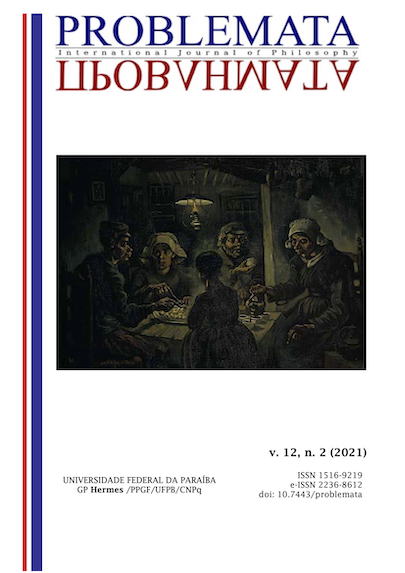THE SOURCES OF THE SELF:
REFLECTIONS AND EXPLANATIONS CONCERNING THE CONCEPT OF MODERN IDENTITY BY CHARLES TAYLOR UNDER THE INFLUENCE OF HEGEL
DOI:
https://doi.org/10.7443/problemata.v12i2.54391Keywords:
Charles Taylor, authenticity, Recognition, HegelAbstract
This article is mainly aimed to explain the central ideas of the work of Charles Taylor Self sources. The article can be divided into three steps. At first, I will develop a brief introduction contemplating an explanation of what I call the question horizon proposed by the author. In a second step, I will discuss the theory held by Taylor, an ethic of authenticity, it should not seized together with its proposal for a reconnaissance policy. In a third step, we will hold a brief conclusion of the concepts addressed throughout the article. Both conceptual explorations developed by Taylor develop far beyond just a purely descriptive effort of modern identity. On the contrary, the work is defined as a practice of the "rescue" of renegade sources of modern morality, with the clear intention to criticize and rework our self-understanding as moral agents so that we can work actively in solving dilemmas moral and political contemporary world.
Downloads
References
ARAUJO, Paulo Roberto M. de. Charles Taylor: para uma ética do reconhecimento. São Paulo: Edições Loyola, 2004.
HEGEL, G.W.F. (1807). Fenomenologia do Espírito. Tradução de Paulo Meneses. Petrópolis: Editora Vozes, 2. ed., 2003
HEGEL, Georg Wilhelm Friedrich. Gesammelte Werke. Hamburg: Felix Meiner, 1968-2009. 21 v. ISBN 3787302670(v.1)
INWOOD, M. (1992). Dicionário Hegel. Rio de Janeiro: Jorge Zahar Editor, 1997.
TAYLOR, Charles. As fontes do self: A construção da identidade moderna. (Trad. Adail U. Sobral e Dinah de Azevedo de Abreu). São Paulo: Edições Loyola, 1997.
TAYLOR, Charles. The Ethic of Authenticity, Harvard University Press, Cambridge, 1992.
TAYLOR, Charles. Modern Social Imaginaries, Duke University Press, London, 2004.
Downloads
Published
Versions
- 2021-12-23 (2)
- 2021-12-23 (1)
Issue
Section
License
Copyright (c) 2021 Rafael Francisco Hiller, Heloisa Allgayer

This work is licensed under a Creative Commons Attribution 4.0 International License.
Authors who publish with this journal agree to the following terms:
- Authors retain copyright and grant the journal right of first publication with the work simultaneously licensed under a Creative Commons Attribution License that allows others to share the work with an acknowledgement of the work's authorship and initial publication in this journal.
- Authors are able to enter into separate, additional contractual arrangements for the non-exclusive distribution of the journal's published version of the work (e.g., post it to an institutional repository or publish it in a book), with an acknowledgement of its initial publication in this journal.
-
- Authors are permitted and encouraged to post their work online (e.g., in institutional repositories or on their website) prior to and during the submission process, as it can lead to productive exchanges, as well as earlier and greater citation of published work (See The Effect of Open Access).





